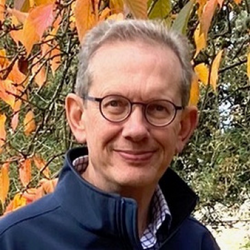Professor Paul Lehner
Chromatin Control of Viral Infection
Departmental affiliation: Cambridge Institute of Therapeutic Immunology & Infectious Diseases (CITIID)
Biography
Paul Lehner is the Sheila Joan Smith Professor of Immunology. His research focuses on the study of novel genes and intracellular pathways involved in virus:host interactions, with a particular emphasis on epigenetic mechanisms of viral silencing. His group discovered the human silencing hub (HUSH) complex – an epigenetic transcriptional repressor complex which provides genome-wide surveillance, defending the genome from retroelement attack. Paul is also an Infectious Diseases Physician.
Research
All life forms need to defend their genome against DNA invasion as it threatens their integrity. Mammalian cells counteract this threat by silencing incoming DNA, prior to transcription. Indeed, DNA silencing through chromatinisation likely represents the default pathway. Perversely, viruses not only introduce and replicate their nucleic acid, but recruit host machinery to enable their replication. Persistent viral survival depends on their ability to evade immune recognition, as seen with both interferon antagonism and DNA silencing.
Uniquely, retroviruses reverse transcribe their RNA into DNA and integrate into host chromosomal DNA i.e. they ‘become genes’. While most integrations are transcriptionally active, for HIV, the most clinically important lentivirus, it is the silenced, integrated HIV proviral pool which defies eradication and mandates lifelong HIV treatment.
Our group uses genetic and proteomic technologies to understand different mechanisms of DNA silencing and to determine how viruses overcome these pathways. Prominent among our discoveries was identification of the HUSH epigenetic repressor complex. HUSH silences incoming retroviruses as well as endogenous mobile retrotransposons (LINE-1 elements), which make up >17% of our genome. Our work provides unique insight into chromatin regulation and opportunities for manipulating these pathways.
Key Publications
Tchasovnikarova IA, Timms RT, Matheson NJ, Wals K, Antrobus R, Göttgens B, Dougan G, Dawson MA, Lehner PJ. Epigenetic silencing by the HUSH complex mediates position-effect variegation in human cells. Science. (2015) PMID: 26022416
Seczynska M, Bloor S, Cuesta SM, Lehner PJ. Genome surveillance by HUSH-mediated silencing of intronless mobile elements. Nature. 2022 PMID:34794168
Seczynska M, Lehner PJ. The sound of silence: mechanisms and implications of HUSH complex function. Trends in Genetics 2023 PMID: 36754727
Contact: pjl30@cam.ac.uk


